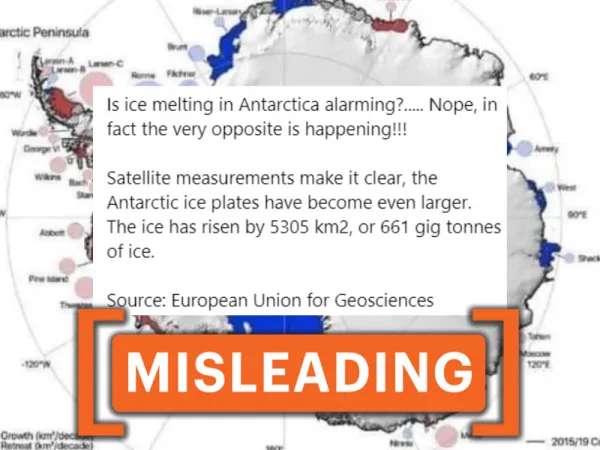By: Emilia Stankeviciute
June 25 2024
 Screenshots of the claim. (Source: Facebook/Screenshot/Modified by Logically Facts)
Screenshots of the claim. (Source: Facebook/Screenshot/Modified by Logically Facts)
The claim that the Antarctic ice sheet is growing is misleading. Multiple studies confirm it is losing ice mass, contributing to sea level rise.
Context
A claim has been circulating on social media that Antarctic ice is not melting but is instead growing by at least 5,305 km² and 661 gigatons. This information is being used to dispute reports of ice melt in Antarctica.
Several posts featuring this claim, shared on Facebook, have gained substantial traction. One post amassed over 670 likes and more than 970 shares (archived here), while another garnered over 820 likes and exceeded 1,600 shares (archived link here).
Posts and a map showing changes in Antarctic ice shelves from 2009 to 2019 were shared. The source of the claim is cited as the "European Union for Geosciences."
Antarctic map of ice shelf area change from 2009 to 2019. (Source: Facebook)
In fact
The study likely referenced by the claim is "Change in Antarctic Ice Shelf Area from 2009 to 2019," published in The Cryosphere, a journal of the European Geosciences Union (EGU).
While the study does indicate a net gain in ice shelf area by 5,305 km² and an ice mass increase of 661 gigatons from 2009 to 2019, this data pertains specifically to ice shelves and not the entire Antarctic ice sheet. Ice shelves are floating extensions of land ice and can exhibit different behaviors compared to grounded ice. The increase in ice shelf mass does not negate the significant ice loss occurring in other parts of Antarctica.
The EGU is a Germany-based non-profit organization of scientists committed to achieving excellence in geosciences and planetary and space sciences to benefit humanity globally. Logically Facts contacted the EGU for comment on this study but did not receive a response.
Overall, Antarctica is experiencing a significant loss of ice mass. According to NASA, the Antarctic ice sheet has been losing about 150 billion tons of ice annually since 2002, contributing to global sea level rise.
Another study by the EGU, "Antarctica Factor," indicates that ice loss from Antarctica alone could result in a sea level rise of up to 58 centimeters by the end of the century if current emission trends continue.
Additionally, according to NASA, 2023 saw Antarctic sea ice extent reach record low levels, indicating a troubling trend of ice loss. The regional gains in ice shelf mass outweigh the substantial losses in other areas, particularly in West Antarctica and the Antarctic Peninsula.
The Ice Sheet Mass Balance Inter-comparison Exercise (IMBIE) reports that West Antarctica loses approximately 82 gigatons of ice annually, while the Antarctic Peninsula loses about 13 gigatons annually. The gains in other Antarctic regions or the ice shelves do not offset these losses.
IMBIE is an international collaboration of scientists dedicated to measuring changes in the ice sheets of Antarctica and Greenland. Supported by NASA and the European Space Agency (ESA), it uses satellite data to assess ice sheet mass balance accurately.
The verdict
The claim that the Antarctic ice sheet is not melting but growing by 5305 km² and 661 gigatons is misleading. Multiple scientific studies and recent data from reliable sources confirm that the Antarctic ice sheet is experiencing a net loss in ice mass, contributing to global sea level rise.